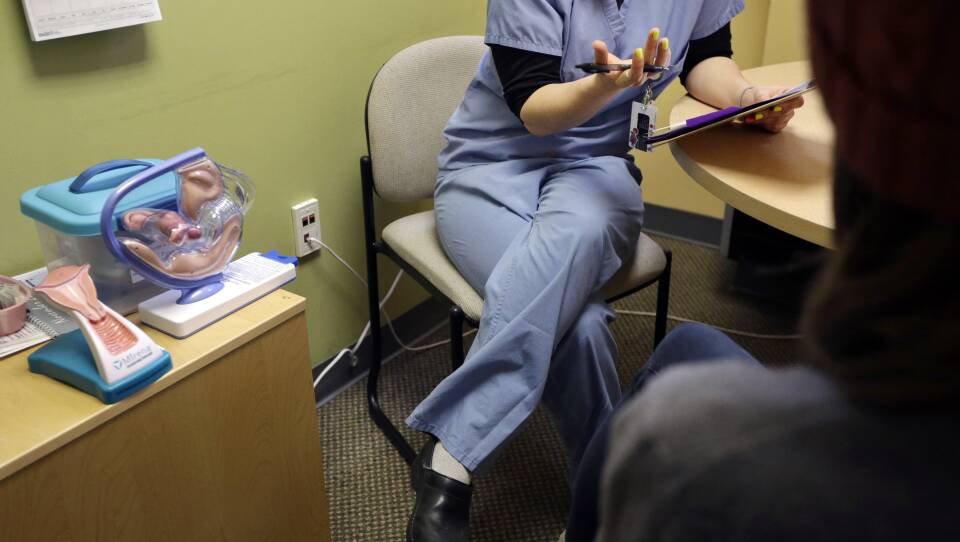There wasn't a flood of people traveling to Massachusetts for abortions in the wake of Roe v. Wade’s collapse, new state data shows.
Over 900 people traveled to the commonwealth for an abortion in 2022, accounting for just over 5% of all Massachusetts abortions. That’s up from 792 in 2021 for an increase of under 130 people overall.
“I don't think that we're being completely inundated at this point,” said Cara Callahan, a co-founder of the newest Massachusetts abortion fund Tides for Reproductive Freedom.
When the Supreme Court overturned Roe v. Wade in June 2022, some worried that the state would see a surge in people crossing state lines to get abortions because Massachusetts laws were some of the least restrictive in the country. So far, it hasn’t materialized.
Researchers and advocates agree: For 2022, there are simply “no big surprises,” as Reproductive Equity Now’s Rebecca Hart Holder put it.
“We will want to keep a very keen eye on those numbers,” Hart Holder said. “We are not Illinois, which is adjacent to Missouri and which immediately absorbed thousands of people seeking abortion care. But we are one of the states that will feel the ripple effects of bans and then delays in accessing care.”
To take Hart Holder’s example, even before Roe fell, in 2021, more than a quarter of all abortions in Illinois were for women traveling from out of state.
The picture is less clear in the nearby state of New Hampshire, which does not collect data at the state level. But Josie Pinto, who leads the Reproductive Freedom Fund of New Hampshire, says the trend appears to be similar to Massachusetts: people are traveling from out of state when they have a connection to New Hampshire.
“They're not really, like, coming to New Hampshire just because — they're coming because they have someone to stay with, [maybe] they went to school here,” Pinto said. “Same with Massachusetts. There's ... a reason usually that they're coming there, because otherwise they're just going to go to wherever it's closest.”
The total number of abortions in Massachusetts also ticked up last year, but still stayed below pre-pandemic figures.
“We’ve been seeing a decline in overall abortion numbers and rates in Massachusetts for 25 years, and that’s due to increased access to effective contraception and increased use of effective contraception,” said Liz Janiak, Planned Parenthood League of Massachusetts’ Director of Social Science Research, who co-authored a research paper on the drop in abortions in Massachusetts during the pandemic.
More Local News
Medication abortion is still the preferred method for abortion, over various surgical options, and in 2022 it crossed a threshold: it's now the way that a majority of people in Massachusetts choose to end their pregnancies. More than half — 52% — used the two-drug regimen instead of other surgical procedures, up from 35% just five years before.
That milestone comes as the legal bounds of one of those drugs, mifepristone, are in question. An appeals court ruled on Wednesday that some FDA restrictions should be reinstated, which would eliminate the ability to send the medication to patients through the mail. But nothing will change immediately: The decision defers to the Supreme Court, which could take several months to rule if it takes up the case.
In April, when the case was first being decided by a lower court in Texas, Gov. Maura Healey put together a stockpile of mifepristone that would last more than a year if it were taken off the market altogether. Providers have vowed, too, to continue providing the drug in Massachusetts.
Janiak expects that the number of medication abortions in Massachusetts could rise even higher over the course of 2023. Millions of dollars from the state poured into reproductive health organizations after the Supreme Court’s decision, with a large portion going to a chain of clinics in southeastern Massachusetts to start providing medication abortions. They started offering that option last month at seven clinics across the region.
Historic trends held true, too. More than 9 in 10 abortions were performed in the first 12 weeks of pregnancy, according to the 2022 data. Abortions performed farther along in the pregnancy, post-24 weeks, were still vanishingly few at 41 in total, or 0.2%.
“It was an increase from 10 in 2019,” Hart Holder pointed out. “[That] speaks to the fact that more people are able to access care with their own doctors in their home state.”
“Twenty-four weeks and later abortions have always been rare and will always be rare because they just only arise from extraordinary social and medical circumstances,” Janiak said. “So it's not surprising that one wouldn't see a large number.”









